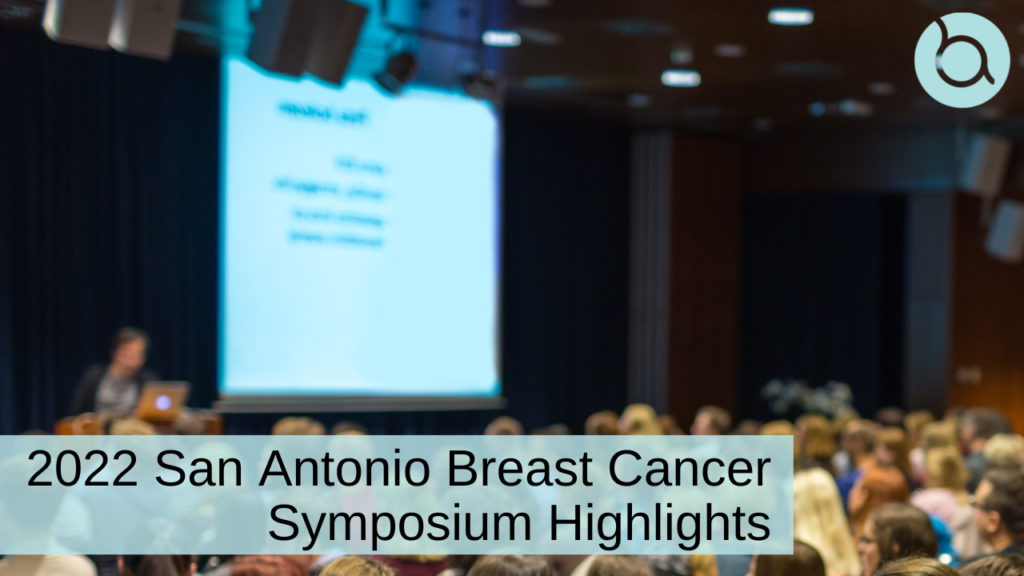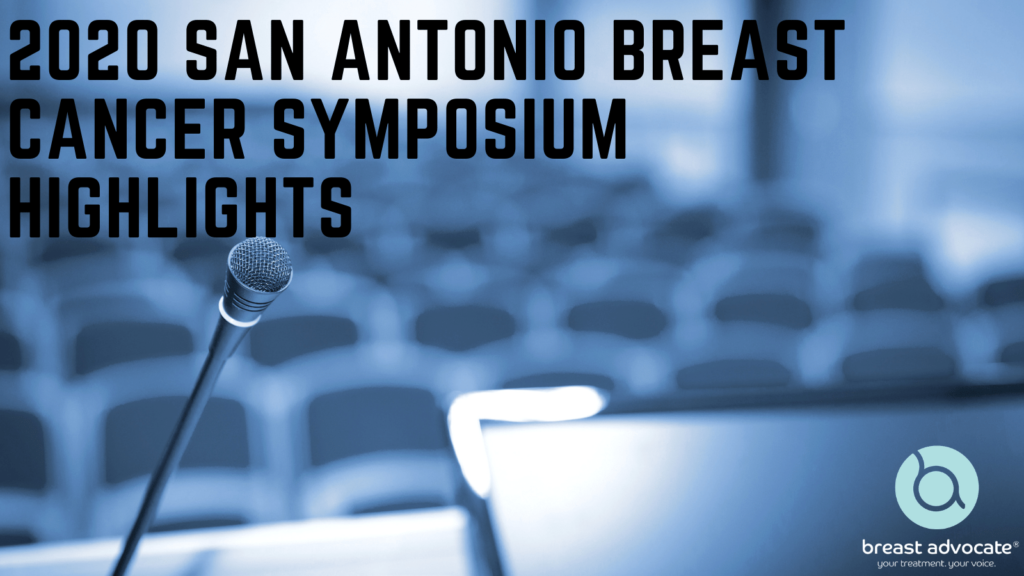2022 San Antonio Breast Cancer Symposium Highlights

Now in its 45th year, the 2022 San Antonio Breast Cancer Symposium (SABCS) was held in person in San Antonio, Texas. SABCS is an annual event sponsored by the American Association for Cancer Research and UT Health San Antonio’s Mays Cancer Center. The meeting hosted about 10,000 clinicians and scientists from all over the world.
The meeting included research and information on the experimental biology, etiology, prevention, diagnosis, and treatment of breast cancer and premalignant breast disease.
In case you missed it, you can check out the many studies presented here. We have also included an overview of some of our top highlights below:
Investigating Disparities in Breast Cancer
This trial showed recurrence scores were similar among the racial subgroups; there was no difference in tumor size or the number of positive lymph nodes. However, tumor grade was significantly different among the groups.
In comparison, black and Hispanic women have more grade 3 tumors than white or Asian women. The five-year invasive disease-free survival rate was lower for black women. Despite similar recurrence score results, black women with this type of breast cancer have worse outcomes than white women. Novel methods to enhance clinical outcomes are still urgently needed, particularly for black women.
Who Goes to the ER During Treatment?
Researchers set out to determine if insurance status might be a proxy for structural barriers to outpatient quality of care, given that many unplanned ER visits and hospitalizations are preventable. In order to link the trial data to the participants’ insurance claims, they combine breast cancer patients 65 and older who had taken part in SWOG clinical trials between 2001 and 2019 (either Medicare, Medicare plus commercial, or Medicare plus Medicaid).
They discovered patients with Medicare and Medicaid were more likely to visit the ER within a year of enrolling in a clinical trial.
“Despite participation in a breast cancer clinical trial, patients with Medicare plus Medicaid had a two-fold increased risk of unplanned ER visits despite controlling for clinical, demographic, and prognostic factors,” the team wrote in their analysis.
Identifying Gaps in Metastatic Cancer Care
Breast oncologist, Poorni Manohar, MD, analyzed the insurance policies and electronic health records of 1101 patients with metastatic breast cancer, 386 of whom were diagnosed with de novo disease, meaning their cancer had already spread by the time the initial diagnosis was made. A total of 715 patients had recurrent disease. The researchers then determined who among those 715 patients had — or hadn’t — received the recommended biopsies and biomarker tests.
Half of the patients who needed biopsies to determine the molecular makeup of their new to determine the best course of treatment did not receive them.
“If we can increase access to resources, improve institutional experience with biopsy of challenging sites, and offer alternatives to biopsy, we could greatly enhance the quality of care for patients,” she said.
Women Can Safely Interrupt Endocrine Tx to Pursue Pregnancy
Over 500 women for whom endocrine therapy had been stopped in the hopes of getting pregnant participated in the study. Almost all (93.4%) had stage I/II HR-positive breast cancer. The goal was to determine the risk of breast cancer relapse associated with interrupting therapy for 2 years. The study found no more than 46 breast cancer–free interval (BCFI) events as the safety threshold. A BCFI event was defined as local, regional, or distant recurrence or a new invasive contralateral breast cancer.
For young women who want to become pregnant after receiving a diagnosis and completing treatment for HR-positive breast cancer, this trial is more confirmatory but still a crucial step. It appears that the women in the study did not experience any negative effects or an increased risk of cancer recurrence as a result of stopping endocrine therapy to become pregnant.
You can view more highlights from the SABCS here.
2020 San Antonio Breast Cancer Symposium Highlights

As with most gatherings this year, the 2020 San Antonio Breast Cancer Symposium was held virtually. Even though this highly anticipated annual conference was unable to be hosted in person, the evidence-based information and new research findings were shared via amazing modern technologies. Breast cancer certainly doesn’t stop durning a global pandemic so it was absolutely wonderful this world-renowned breast cancer conference was still held, even if the experience was a little different this year. If you missed it, you can still read over the many studies presented here. We have also provided an overview of some of our top highlights below:
Study finds more women can safely avoid chemo.
Results from RxPONDER trial suggest some women with hormone receptor-positive cancer and lymph node involvement may not need chemotherapy. According to the study, chemotherapy did not lower the risk of cancer returning for postmenopausal women with low Oncotype DX scores (under 25) and cancer in 1-3 lymph nodes.
Metastatic breast cancer patients experience more time without disease progression with new oral chemotherapy.
When combined with capecitabine, metastatic breast cancer patients experienced a longer timeframe without cancer growth/spread. The CONTESSA trial found that patients taking both tesetaxel and capecitabine went about 10 months without disease progression. Likewise, about 57% of patients taking both drugs experienced a higher treatment response rate (meaning their tumors reduced in size).
Pregnancy after breast cancer is safe.
Premenopausal women who may want to become pregnant can still do so safely following breast cancer according to a recent European study. The study did however find that some women may not be able to naturally conceive following breast cancer treatment. For this reason, it is important for women considering pregnancy following a breast cancer diagnosis to discuss fertility preservation options prior to undergoing treatment.
Breast cancer patients are at a greater risk for chronic opioid use.
Women who have a mastectomy and reconstruction may have a higher risk for future addiction to opioids and sedative-hypnotic drugs. The study out ofColumbia University in New York also found that the chance of becoming a persistent user of both types of controlled substances was significantly higher among women under age 60, those with a breast cancer diagnosis (versus those who had prophylactic surgery) and those treated with chemotherapy. These findings also highlight the importance of ERAS (enhance recover after surgery) protocols which minimize narcotic use after surgery. Patients should take time to discuss ERAS protocols with their surgeons to ensure proper pain management plans are in place before and after surgery to reduce the risk of drug side effects and addiction.
Noteworthy Highlights from SABCS 2019
Breast cancer research continues to expand experts’ knowledge and understanding of the disease and how to treat it. Each year healthcare experts from across the globe gather in San Antonio to present the latest research findings at the San Antonio Breast Cancer Symposium (SABCS). Here is a great video overview of some highlights from this year’s meeting:
For more videos discussing specific studies presented at SABCS 2019, please click here.






